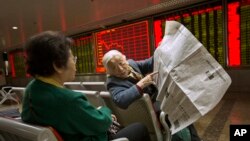European stocks succumbed to another slide in oil prices on Wednesday as markets waited cautiously to see what the Federal Reserve's reaction will be to what has been a brutal start to the year for world markets.
Asian and particularly Chinese bourses ended stronger than they started but that could not prevent the pan-European FTSEurofirst 300 falling just over 0.5 percent in early trading.
There was still some grogginess after gadget giant Apple forecast its first revenue drop in 13 years on Tuesday, but the main pressure was once again from oil which sank back towards $30 a barrel following its latest attempt at a bounce.
Dollar down
Brent was down 2 percent at $31.12 paer barrel with U.S. crude 3 percent lower at $30.50. Currencies followed a familiar dance, with the dollar down against the yen, although it gained less than usual against oil-linked peers like the ruble.
Bond markets were firmly focused on the Fed's post-meeting statement, due at 1900 GMT. After the rocky start to 2016 markets are now expecting only one more rate hike this year rather than the four Janet Yellen and her colleagues were suggesting in December.
"(Markets are) pretty much treading water ahead of the FOMC (Federal Reserve)," said Societe Generale strategist Alvin Tan. "We are expecting a somewhat more dovish tone considering the turbulence in global markets since the start of the year."
U.S. Treasury yields nudged down, with the benchmark 10-year Treasury note yield dipping about 2 basis points overnight to 1.9941. The more interest-rate-sensitive two-year yield hovered at 0.8567.
Yields were also a touch lower in Europe as small rises in French consumer and industry confidence and Italian retail sales did little to alter expectations that the European Central Bank is readying to cut its interest rates again.
Italian bonds were given an extra boost by an accord between the country and the European Commission to help Italian lenders sell some of their 200 billion euros of bad loans eased concerns about the banking sector.
Asian markets
Overnight, a late rally in China reversed an early 3 percent drop and helped MSCI's broadest index of Asia-Pacific shares outside Japan finish 0.5 percent higher.
Tokyo's Nikkei closed up 2.7 percent and the Australian dollar rose after one measure of inflation came in slightly above forecasts.
Valuations have taken a beating in Asia this year.
The benchmark Hong Kong stock market index is now trading at a price-to-earnings multiple of 7.4 times, its lowest since the 2008 crisis, while the China enterprises index is at a multiple of less than 6 times, its cheapest since December 2001.
"The Hang Seng China Enterprises index is currently priced for a credit event, which we think is slightly extreme," said Michelle Leung, CEO of Xingtai Capital Management, a hedge fund focused on Chinese consumer stocks.
The retreat in oil prices in Europe also began to weigh on other commodity markets. Copper, which is seen as highly attuned to global growth, sagged to $4,525 tonne by 0704 GMT, after a 2.7 percent gain in the previous session.
Traditional safe-haven gold meanwhile hovered near a 12-week high at 1,117 an ounce.
"The world's economic condition doesn't seem to give the Fed reason to hike rates soon given the growth risks," said Barnabas Gan, analyst at OCBC Bank in Singapore.





